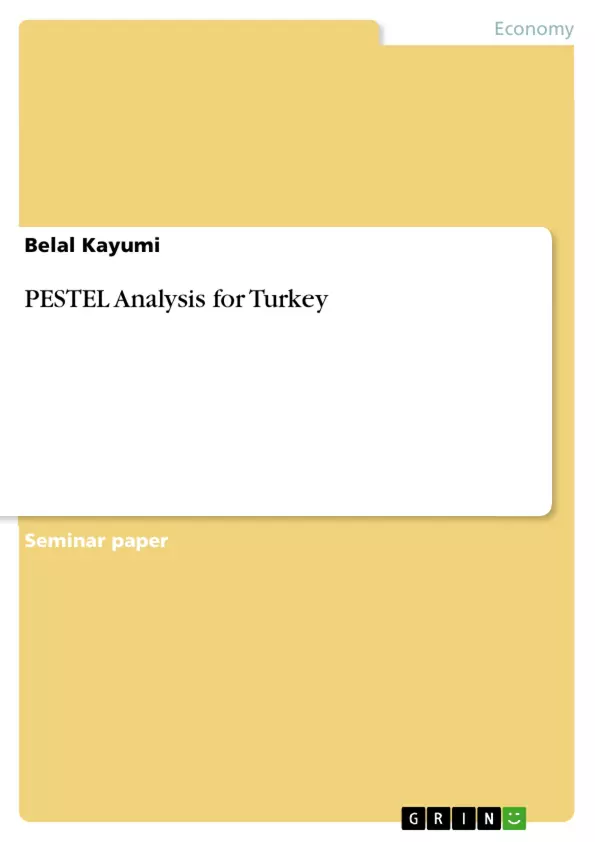This scientific paper is written within the scope of the Global Perspectives of
International Management. A PESTEL analysis is carried out for Turkey and
described with the help of its six factors. In the beginning, the concept PESTEL
is explained and later applied to ‘Turkey’ as a practical example.
Inhaltsverzeichnis (Table of Contents)
- 1. Introduction
- 2. Basic principle of the PESTEL analysis
- 3. PESTEL analysis for Turkey
- 3.1 Political
- 3.2 Economic
- 3.3 Social
- 3.4 Technological
- 3.5 Environmental
- 3.6 Legal
- 3.6.1 Turkish Limited (Limited Sirketi)
- 3.6.2 Public limited company in Turkey
- 4. Conclusion
Zielsetzung und Themenschwerpunkte (Objectives and Key Themes)
The objective of this scientific paper is to conduct a PESTEL analysis of Turkey, explaining the concept of PESTEL analysis and applying it to Turkey as a practical example. The paper aims to provide a comprehensive overview of the political, economic, social, technological, environmental, and legal factors influencing the business environment in Turkey.
- PESTEL framework application
- Political landscape of Turkey
- Economic factors influencing Turkey
- Social dynamics in Turkey
- Legal framework for businesses in Turkey
Zusammenfassung der Kapitel (Chapter Summaries)
1. Introduction: This chapter likely provides a brief overview of the PESTEL analysis framework and its relevance to understanding the business environment in Turkey. It likely sets the stage for the subsequent detailed analysis by introducing the purpose and scope of the study.
2. Basic principle of the PESTEL analysis: This chapter details the PESTEL framework itself. It probably explains each of the six factors (Political, Economic, Social, Technological, Environmental, and Legal) individually and describes how these factors are interconnected and how they influence the business environment. The chapter likely offers a theoretical understanding of the PESTEL analysis before applying it to a case study (Turkey).
3. PESTEL analysis for Turkey: This chapter forms the core of the paper, applying the PESTEL framework to the Turkish context. Each sub-chapter (3.1 through 3.6) likely provides a detailed analysis of the specific factors influencing the business environment in Turkey. For example, 3.2 (Economic) might discuss inflation rates, GDP growth, and foreign investment. 3.3 (Social) might analyze demographic trends, cultural factors, and social attitudes toward business. The sub-chapters systematically break down the complexities of Turkey's business environment according to the PESTEL model.
Schlüsselwörter (Keywords)
PESTEL analysis, Turkey, political factors, economic factors, social factors, technological factors, environmental factors, legal factors, business environment, Turkish economy, foreign direct investment (FDI), gross domestic product (GDP), legal framework, limited company, public limited company.
Frequently Asked Questions: PESTEL Analysis of Turkey
What is the purpose of this document?
This document provides a comprehensive preview of a scientific paper that conducts a PESTEL analysis of Turkey. It includes the table of contents, objectives and key themes, chapter summaries, and keywords.
What is a PESTEL analysis?
A PESTEL analysis is a framework used to analyze the macro-environmental factors that can affect a business. The acronym stands for Political, Economic, Social, Technological, Environmental, and Legal factors. This document explains the basic principles of PESTEL analysis and applies it to the case study of Turkey.
What are the key themes explored in the paper?
The paper explores the application of the PESTEL framework to Turkey, examining the political landscape, economic factors, social dynamics, technological advancements, environmental concerns, and the legal framework for businesses operating within the country. Specific areas include the impact of political factors on the Turkish economy, the analysis of economic indicators such as GDP and FDI, social trends and their influence on business, and a review of the legal structures for businesses in Turkey, including limited and public limited companies.
What are the main chapters covered in the paper?
The paper is structured as follows: An introduction setting the context, a chapter explaining the basic principles of PESTEL analysis, a core chapter dedicated to the PESTEL analysis of Turkey (broken down into sub-chapters focusing on each of the six factors), and finally, a conclusion. The Turkey-focused chapter delves into specific details regarding political stability, economic indicators, social trends, technological development, environmental regulations, and the legal structure for businesses, including different company types.
What specific aspects of Turkey's business environment are analyzed?
The analysis covers a wide range of aspects, including: the political climate and its impact on business, economic factors such as GDP growth, inflation, and foreign direct investment (FDI), social trends and their implications for businesses, technological advancements and their influence, environmental regulations and their impact, and a detailed look at the legal framework for businesses, particularly focusing on the legal structures of limited companies and public limited companies in Turkey.
What are the keywords associated with this paper?
The keywords include PESTEL analysis, Turkey, political factors, economic factors, social factors, technological factors, environmental factors, legal factors, business environment, Turkish economy, foreign direct investment (FDI), gross domestic product (GDP), legal framework, limited company, and public limited company.
What is the overall objective of the scientific paper?
The objective is to provide a comprehensive PESTEL analysis of Turkey, explaining the PESTEL framework and applying it practically to the Turkish business environment. The aim is to give a detailed overview of the factors influencing business activity in Turkey.
- Quote paper
- Belal Kayumi (Author), 2014, PESTEL Analysis for Turkey, Munich, GRIN Verlag, https://www.grin.com/document/271183



